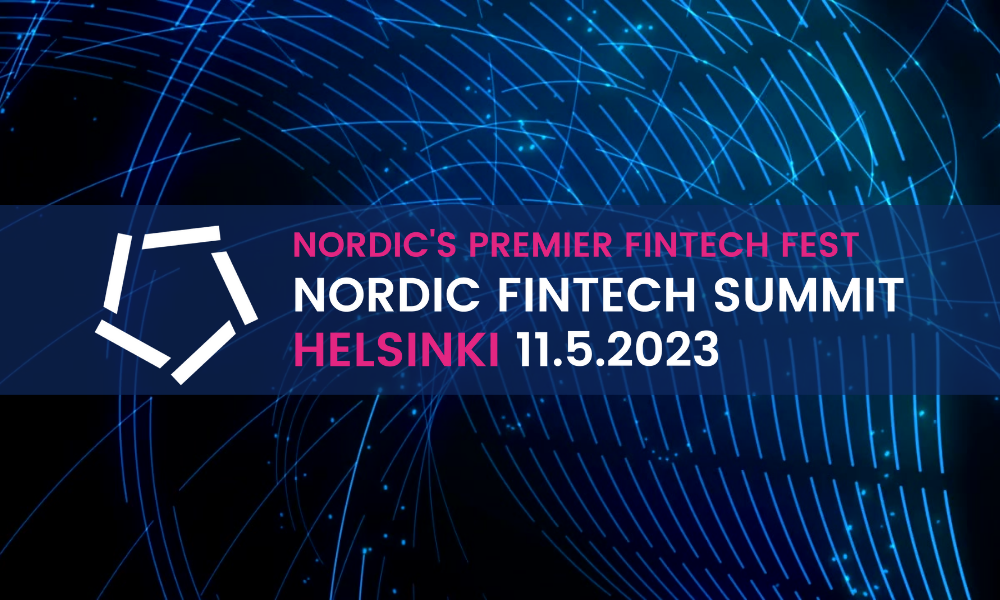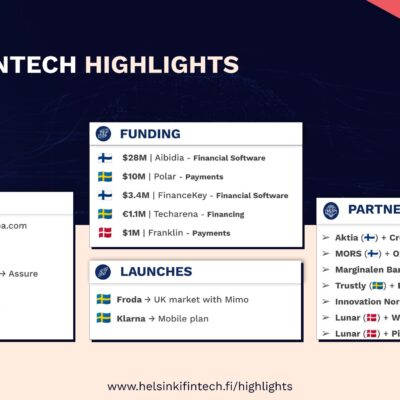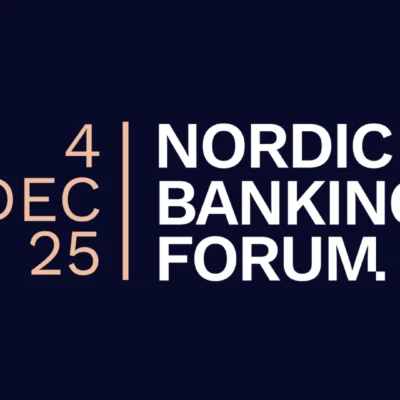Nordic Fintech Summit was held for the second time in Wanha Satama Helsinki on May 11th. The event brought together around 500 people from fintechs, banks, tech companies, and other experts, mainly across Northern and Central Europe, but also from other continents.
The morning session was kicked off by the stage hosts Sarah Häger and Greg Anderson. The opening keynote was given by Christoffer Cederschiöld from Kreditz. As Kreditz had just closed a significant investment to accelerate its growth in open banking-driven credit scoring, Christoffer sees a huge potential in financial data, credit scoring being just the first step, and open finance, covering also areas such as wealth management and insurance as the future image.
The second keynote of the morning session came from the CEO and Co-Founder of Integrated Finance, Alistair Cotton from London. Alistair’s presentation about fintech infrastructure highlighted future competitiveness relying on common infrastructure, and how modern-day fintech success stories are built on a tech stack of multiple providers.
Business Design
The Business Design track started around data and openness as well. Connor Blake from Personetics shared his experiences about utilizing financial data to create more personalized services.
On the other side of the spectrum, European Investment Bank’s Kaisu Christie told about EIB’s role in building open data ecosystems, though she also stressed the importance of data handling and regulation.
Kristina Salemyr from Banqsoft continued the Open Banking discussion with her learnings for banks on moving into embedded finance and Banking-as-a-Service.
Next, we had a proper business talk when Daniel Aarenstrup gave an interesting overview of different pricing models from traditional brands such as Gilette to new models from Google and ChatGPT. Daniel reflected those on the new era of financial services, and how he has been building business models as the CEO of Savr.
The financial service profitability panel discussion brought on stage different types of bankers from ING and TB Bank to Aprila Bank and Bankera. Despite being very different kinds of financial industry firms, all of them still saw opportunities for profitable growth, especially in certain areas of lending and wealth management.
In the last two sessions of the track, we focused on ESG and its impact when The Upright Project’s Annu Nieminen shared her four new requirements for ESG investing.
Eliq’s Joakim Botha continued on how incorporating open energy data could on both personal finance management but also ESG reporting.
Banking Engineering
The Banking Engineering track kicked off with OP Financial Group’s CIO Kasimir Hirn’s presentation on Building Digital Core. Kasimir stressed the importance of highly skilled personnel, especially on the tech side, and how OP has built a digital personal assistant for their customers.
Kasimir also explained their visions of moving towards intelligent omnichannel services, built on the public cloud, utilizing a high level of automation.
Ove Kreison from Tuum continued the engineering discussion by answering the question of whether it’s possible to build a full-blown bank on turnkey solutions and SaaS.
To continue from Ove’s presentation, OP’s Markus Sarja took the stage to show how OP had built consumer lending services in collaboration with their internal innovation lab utilizing Tuum’s platform.
DBT’s CTO Christer Eliasi-Swahn shared his learnings from both cloud migration but also on how to keep the future in mind while designing the architecture. It all came to the same conclusion: cloud first.
TCS’s Shankar Prahalad complemented Christer’s presentation with his learnings about engineering the transition state, in order to eventually achieve a successful transformation of a bank.
AI, of course, was on the menu and we first got insights from Arto Sorvoja from Kyndryl on incorporating AI into digital transformation. This was followed by a lively discussion on AI-first financial services with Silo AI, Google, and Comparables.ai.
To wrap up the track Hanna Khrystianovych from Sigma Software presented about accelerating product development.
Financial Trust
The Financial Trust track saw a stage takeover by the Fintech Daydreaming Podcast hosts Ville Sointu and Pål Krogdahl.
Signicat’s guest speaker Jarno Limnéll (a Professor of Cybersecurity at Aalto University) started the track with a speech about digital security and trust, and how the current pace of development puts security into an even more significant role.
Dittmar & Indrenius’ Hanna-Mari Manninen and Kateryna Shapran continued the topical discussion from a legal point of view and talked about sanctions, and how to comply with them.
The most provocative part of the program was a panel discussion on whether cryptos are a viable part of the financial industry or a scam.
After the so-called crypto winter, panelists Pasi Matilainen (Coinmotion) and Nikolai Gobel (DNB) wanted to highlight that the cryptos are not a Ponzi scheme notably as per they are distributed and that the possibilities of a new asset class in the modern fragile economy, and how the new MICA regulation is getting closer to MiFID II.
The next discussion featured Juha Viitala (Membrane Finance) and Miki Kuusinen (Bank of Finland. Moderated by Ville Sointu, the discussion enlightened the purpose of stablecoins with use-case examples such as data monetization and the demand for a digital native money securities tokenization.
When it comes to CBDCs and privacy, it was brought up that ECB has no interest in knowing details about each transaction.
The track was closed by Tommy Jarnemark’s (Verified Global) and Siam Choudhury’s (Pliance) take on compliant customer onboarding, anti-money laundering and technology.
Future Commerce
The Future Commerce track was opened with Visa’s Linus Olofsson’s keynote about the future of the Nordic payment landscape, highlighting how the Nordic countries are at the forefront when it comes to payments.
Next, Taru Möller (Nordea) explained the transforming role of banks in digital commerce.
More B2B perspective was provided by XMLdation’s and OP’s discussion around B2B payments.
Kim Fuglsang Kristoffersen (Vipps MobilePay) and Christopher Lindfeldt (Surfboard Payments) discussed mobile payments. The conversation was moderated by Fintech Farm’s Ola Sundell and highlighted the need to bridge intuitive payment solutions between consumers and merchants.
For example, the European digital ID is something to look into and the potential of the US big tech companies being more involved should not be underestimated.
Neonomic’s Christoffer Andvig focused on the massive potential of the $7 trillion BNPL market in his presentation.
The track was concluded with a panel discussion about embedded finance with SME Finance, Klarna, Starcart, and Provenir, pinpointing the massive opportunities, but also challenges in embedded finance.
The stage program ended with a panel discussion about fintech investments with Citi Ventures, Apis, and Inventure.
Key takeaways
Open Banking and Data are already broadly utilized but yet in a very early phase. The discussion around that is no longer about the tech but the business models and value.
Profitability is POP. After the recent developments in the VC market, it’s also time for fast-growing companies to focus on profitable growth.
Cloud and flexibility is where everyone wants to be. There is still a long way to go, especially with banks running on legacy platforms.
AI, particularly generative AI is the topic of the spring. Everyone has their eyes on AI and more use cases will emerge rapidly.
The payment industry is seeing more alternatives and API payments are only ramping up. The winning platform is still to be decided, both domestically and globally.
Trust is still what financial industry is about. Even though maintaining it is costly, it’s indispensable.



